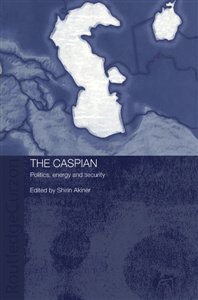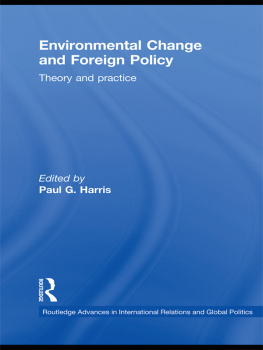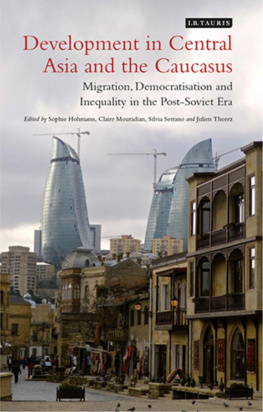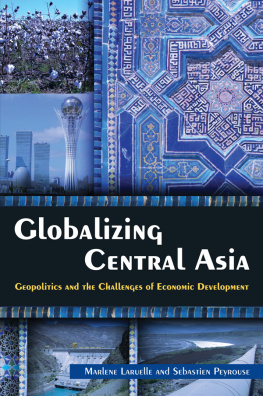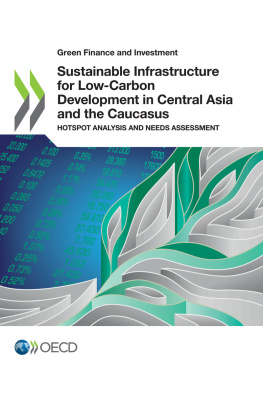SUSTAINABLE DEVELOPMENT IN CENTRAL ASIA
CENTRAL ASIA RESEARCH FORUM SERIES
THE CASPIAN
Politics, Energy, Security
Shirin Akiner & Anne Aldis
SUSTAINABLE DEVELOPMENT IN CENTRAL ASIA
Shirin Akiner, Sander Tideman, Jon Hay
QAIDU AND THE RISE OF THE INDEPENDENT MONGOL STATE IN CENTRAL ASIA
Michal iran
THE BUKHARANS
A Dynastic, Diplomatic and Commercial History 1550-1702
Audrey Burton
TAJIKISTAN
The Trials of Independence
Mohammad-Reza Djalili, Frederic Grare, Shirin Akiner
UZBEKISTAN ON THE THRESHOLD OF THE TWENTY-FIRST CENTURY
Islam Karimov
CENTRAL ASIA
History, Ethnicity, Modernity
Sara Koplik, Kumru Aruz, Petra Steinberger
SUSTAINABLE DEVELOPMENT IN CENTRAL ASIA
Edited by
ShirinAkiner,
SanderTideman
and
JonHay
First published 1998 by Curzon Press
Published 2019 by Routledge
2 Park Square, Milton Park, Abingdon, Oxon OX14 4RN
52 Vanderbilt Avenue, New York, NY 10017
Routledge is an imprint of the Taylor & Francis Group, an informa business
Copyright 1998 Shirin Akiner, Sander Tideman and Jon Hay
All rights reserved. No part of this book may be reprinted or reproduced or utilised in any form or by any electronic, mechanical, or other means, now known or hereafter invented, including photocopying and recording, or in any information storage or retrieval system, without permission in writing from the publishers.
Notice:
Product or corporate names may be trademarks or registered trademarks, and are used only for identification and explanation without intent to infringe.
Typeset in Sabon by LaserScript, Mitcham, Surrey
British Library Cataloguing in Publication Data
A catalogue record for this book is available from the British Library
ISBN 13: 978-0-7007-0419-4 (hbk)
Contents
by Punsalmaagiin Ochirbat, former President of Mongolia
by Kushok Bakula Rinpoche, Ambassador of India to Mongolia
Sander G. Tideman, Council for Sustainable Development of Central Asia (CoDoCA)
Shirin Akiner
Helena Norberg-Hodge
Sander G. Tideman
Z. Batjargal
Alicia J. Campi
Zane G. Smith
Graham Clarke
Wang Tao
Frank B. Roseby
Aliya S. Beisenova
Richard M. Auty
Khojamakhmad Umarov
Mahesh Banskota
Thomas Fisher
Guide
Punsalmaagiin Ochirbat
President of Mongolia 1993-1997
First of all I would like to express my appreciation for the publication of this book which discusses the sustainable development of Central Asia, a region destined to play an important role in global political and socio-economic life, and to wish the Council for the Sustainable Development of Central Asia every success in its activities.
The early 1990s witnessed nations starting to redefine the principles of their interaction to harmonise them with the changing times, whereby a trend towards unification on a regional and subregional basis for the purpose of resolving security and developmental issues became a reality. Hence, organising at this juncture a conference on Central Asia's development issues and bringing together scholars and experts in the field for a competent exchange of views and ideas was an event not only of regional but also of global significance.
We, the Central Asian nations living in the heart of the Eurasian land mass, are all linked by many common traits determined by geography, our historical and cultural backgrounds, security interests and traditional relations. The level of our economic development is generally the same as well. The emergence of newly independent states on the world's political map following the disintegration of the Soviet Union has given birth to a new region with a political and economic identity of its own. It would be appropriate if this reality found due reflection in the fabric of the world community, in particular in the structures of the UN and other international bodies. I voiced this idea of mine at the UN General Assembly in 1992.
Today all countries of the region are carrying out structural changes in their economies in order to make a transition to market economy relations. They are living through highly similar difficulties to reach one and the same ends. Hence, our communality is further enhanced, clearly indicating that we have a host of issues, resolution of which calls for our concerted effort. This region is rich in energy-generating and other types of natural resources, as well as in intellectual potential which has not yet been fully tapped. Furthermore, in geopolitical terms it is a bridge that links Europe and Asia, and as such will play an important role in international relations. In this sense our region has bright prospects for development.
The first Conference on Sustainable Development in Central Asia was held in Mongolia. It was a brain-storming session designed to chalk out the directions and mechanisms of regional cooperation. Collaboration in order to create the legal and material prerequisites for access to the oceans and the all-Asian communications network would serve the interests of each and every one of us. We face a need and have a great possibility to develop integral security, economic and cooperation systems, and to work jointly to protect the environment and turn Central Asia into a stable, nuclear-weapon-free region.
To my mind, it would be proper if the Council for Sustainable Development in Central Asia came up with a set of recommendations on how we, as a region, can contribute to the international endeavour to ensure the right balance between human activities and Nature, that is, to ensure sustainable development. At this period of structural adjustment, environmental protection is an issue which calls for cooperation, as it is critical to developmental prospects and the future of our world. We could jointly devise an action plan for implementing the Agenda 21 adopted by the Rio de Janeiro ecological summit of 1992, and submit a joint proposal on representing Central Asia on the Committee for Sustainable Development which was set up in the wake of this summit meeting.
I hope the conference will yield palpable results. Please, accept my wishes for every success in your work.
Kushok Bakula Rinpoche
Ambassador of India to Mongolia
It is a great privilege to be asked to write a Foreword to a progressive work of this nature. The Council for the Sustainable Development of Central Asia pioneered a work of great significance by organising the 'Conference on Sustainable Development in Central Asia' in Ulaanbaatar, Mongolia, in 1994. Thanks to the dedication and organisational skills of those who worked with the Council, the conference was well attended and successful. Many thoughtful individuals interested in the region, from all walks of life, from Central Asia and other parts of the globe, shared their views, and generated a pool of farsighted ideas.
No breakthrough is worthwhile unless it is followed up. Therefore, the Council for the Sustainable Development of Central Asia is publishing this collective wisdom in the present book, for the benefit of one and all.




